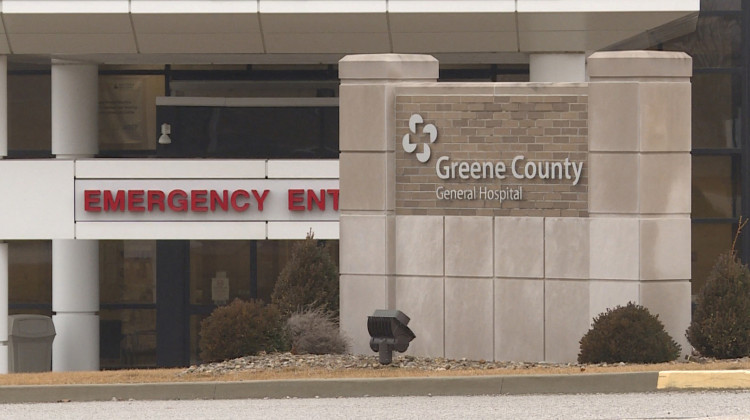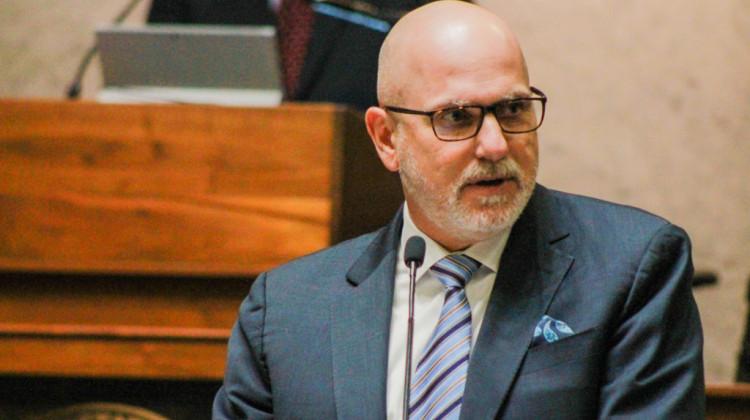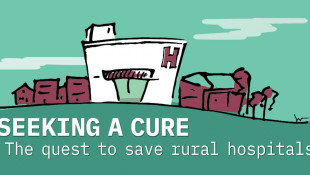
Greene County's General Hospital is preparing for an outbreak of cases amid a short supply of equipment.
WFIU/WTIU NewsCities are getting hit the hardest by the coronavirus right now. In Indiana, nearly half of the confirmed cases are in Marion County, but with the expected surge still weeks away, rural communities face additional challenges.
Indianapolis has a population of nearly 900,000 people, but cares for them with several hospitals and a handful of trauma centers. Estimates show the city has access to over 500 trauma beds, and that number is expected to increase.
Rural Communities Face Different Challenges In Coronavirus Fight
Compare that to Adams County which was one of the first rural counties that reported a case of COVID-19, and the differences are glaring. The county’s population is about 35,000 and they have only a single hospital.
Sixteen counties in Indiana don’t have a single bed or hospital.
The majority of Indiana’s rural communities are served by critical access hospitals. They have to abide by all sorts of federal regulations including limitations on their size. While some of those have been loosened recently, usually the maximum number of in-patient beds they can have is 25, and most are only equipped with a couple of ICU beds.
"I think the challenges are that our resources don’t run very deep," Brenda Reetz says. She is the CEO at the Greene County General Hospital -- a critical acceess facility that is the only hospital in the county. She says there are numerous challenges she and her staff face.
"Larger facilities you can have more depth to your staffing pool, you have more depth to your supply chain, and in communities like this you’re maybe one or two layers deep at all," Reetz says. "But, I also acknowledge that that’s also somewhat proportionate."

An executive order from Gov. Eric Holcomb now allows retired health care workers along with graduating med students and out of state practitioners to help care for the potential surge in COVID-19 patients.
"We’re working to increase the workforce and remove barriers to retired healthcare providers returning to work in some capacity," State Health Commissioner Kristina Box says. "Personnel and equipment are obviously needed to address this crisis."
Recently, the state announced hospitals here have a ICU bed capacity of 1,940. Additionally the state says there nearly 1,200 ventilators. Both numbers are expected to increase.
However supplies are also a struggle. Surgical gowns, gloves, masks, respirators and other equipment designed to protect healthcare workers from injury or the spread of illness are depleted.
Reetz’s staff has gone to extraordinary lengths to find equipment.
“Yep, we’re right there," she admits. "We’ve been to the local hardware stores and we’ve checked out their inventory.”
She also worries about the number of ventilators locally.
"The first several orders that we placed were declined because of backorder," she says. "So, while we have a few right now on order, we haven’t received them, and we don’t count that we have anything til it comes in the door.”
Hospitals have begun operating and reporting in their public health preparedness districts. Which allows facilities to pool resources and increases reporting in hopes of bettering patient outcomes and helping manage a potential influx of patients.
Hospital Finances Could Create Future Strain
To make matters worse, the finances of many hospitals are also taking a hit.
Facilities usually rely on elective and outpatient procedures paid for by private insurance companies to boost their revenues. The emergency services they provide typically don’t add revenue and cost a lot to maintain. That’s causing concern as many hospitals cancel elective procedures to prepare for COVID-19 patients.
"Many of our rural hospitals, the largest share of their payment the revenue they receive comes from government sources—Medicare and Medicaid—that pays well below the cost of delivering those services," Brian Tabor ,president of the Indiana Hospital Association says.
He worries the pandemic could cause some hospitals to close.
"The economics of that are not going to play out for very long in a way that will allow many small hospitals or anyone with fragile finances to survive," he says.
Executives agree it’s difficult financially, but for now, they are more focused on the short run.
For Reetz, it is not her facility’s finances that are keeping her up at night right now, it’s her employees -- many of which are friends and neighbors.
“They put their lives on the line every day when they come to work," she says. "That seems a little dramatic on most days, but in a scenario like this, it really is true, and I appreciate what they do, and I just want to keep them safe.”
 DONATE
DONATE






 View More Articles
View More Articles


 Support WFYI. We can't do it without you.
Support WFYI. We can't do it without you.